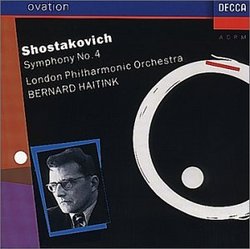| All Artists: Dmitry Shostakovich, Bernard Haitink, London Philharmonic Orchestra Title: Dmitri Shostakovich: Symphony No. 4 - Bernard Haitink Members Wishing: 0 Total Copies: 0 Label: Decca Original Release Date: 1/1/2000 Re-Release Date: 7/18/2000 Album Type: Original recording reissued Genre: Classical Styles: Historical Periods, Modern, 20th, & 21st Century, Symphonies Number of Discs: 1 SwapaCD Credits: 1 UPC: 028942506527 |
Search - Dmitry Shostakovich, Bernard Haitink, London Philharmonic Orchestra :: Dmitri Shostakovich: Symphony No. 4 - Bernard Haitink
 | Dmitry Shostakovich, Bernard Haitink, London Philharmonic Orchestra Dmitri Shostakovich: Symphony No. 4 - Bernard Haitink Genre: Classical
|
Larger Image |
CD DetailsSimilar CDs |
CD ReviewsAn overwhelming recording of an overwhelming work MartinP | Nijmegen, The Netherlands | 08/20/2002 (5 out of 5 stars) "Is there any other work in the symphonic repertoire boasting this number of minor seconds, I wonder? Not until I acquired a score of this incredible masterpiece did I realize that some of the sounds that I thought were, say, strange kinds of horn-trills, were actually an A and a G sharp grinding against each other in the same octave, and causing the weird oscillations I mistook for a trill. Effects like these testify to the tremendous sonic imagination Shostakovich must have possessed, and this work is full of such otherworldly sounds. Only listen to the end of the second movement, where the ghostly menuetto evaporates over the obsessively ticking clockwork of wood blocks and side drum - it is time running out: a musical vignette that the composer tellingly reused in the final pages of his final symphony. This work is brimming with such inspirations, some wild, some deeply moving. To my mind it is easily the greatest of Shostakovich's 15 efforts in this genre, and one of the greatest symphonies of the 20th century all round. It is a work that still sounds utterly contemporary and relevant today, a modern piece in the best sense of the word: its speaks a language that has direct impact and appeal. There is much anger, anguish and desolation, but at times the mood abruptly changes into wry humour and even a (very) occasional burst of joy. All of this is moulded into a post-modernist collage-like structure. It isn't easy listening, but it is a thoroughly cogent and gripping musical experience, unlike those unworldly academic experiments that infested the second half of that century. Many approaches are possible to a work so multi-faceted. Among Russian recordings Rozhdestvensky's (Olympia) is very impressive, who opts for the brutally vitriolic approach, sometimes crossing the border from music-making into committing acts of violence. Rattle's recording on EMI highlights the modernist tendencies and stunning harmonies of this work in a generally more objective approach. Järvi, in an impressively recorded take for Chandos, went Mahlerian. And Haitink on this Decca disc has yet another perspective on offer. His reading has an inexorable, dark majesty, with the long stretches of brooding desolation compellingly characterized. It is big, patient and rugged, and it is also a reading of remarkable beauty, not an adjective that springs to mind easily with this work. The recording, though 20 years old, is more sumptuous and detailed than any other I know; for once for instance the manic ostinato of the timpani during the final C-major peroration is clearly audible. Even in the thickest textures, like the psychopathic march following the famous string fugato in the first movement, the sound never deteriorates into a noisy blur, as it often does: themes and instrument groups retain their separate recognizability. (That fugato, by the way, is itself taken at nothing near the manic speed preferred by some conductors, which improves clarity but takes away some of the sheer madness of it). As we are used of him, Haitink steers clear from overblown histrionics, but lets the notes and the architecture speak for themselves. He doesn't turn the music into a roller coaster ride like others have done, which to some listeners may be a disappointment. With him it is rather like witnessing a tremendous and catastrophic natural event unfolding slowly but inevitably and with an unsettling beauty also, like a volcano erupting. After the final faux-climax subsides, the ensuing bleak emptiness, with the restless heartbeat of timpani and double bass, and violins lost in icy musings, turns into a vision of eternity itself - not in the cozy biblical sense of course, but in that of astronomy, with the celesta aptly drawing its question mark across the infinite senseless vista's. Well, don't waste any more of your time on my lyrical digressions... better buy this disc!" A marvelous interpretation of a difficult work D. Wolf | Fairfax, VA USA | 10/14/2001 (4 out of 5 stars) "Haitink clearly "gets it." This work has been recorded poorly by others, but Haitink and the LPO clearly understand that Shostakovich was trying to create something new within the symphonic form. The political climate that surrounded the creation and release work affects how one listens to it, and Hiatink makes sure the dissonance is clear without using it to punish the audience as some Shostakovich interpreters have. The only recording of this work that I prefer is Previn's with the Chicago Symphony (gotta love the CSO horns doing Shostakovich!). Nonetheless, this is a great recording. My only small wish is that Haitink would have added more tension to the remarkable conclusion of this work." DSCH's first symphonic masterpiece R. Hutchinson | a world ruled by fossil fuels and fossil minds | 02/06/2003 (5 out of 5 stars) "This is a brilliant performance of Shostakovich's 4th, composed in 1936 and not performed until 1961, during the Kruschev thaw. It is a massive, sprawling work that contains within it all of the characteristics the mature composer would pursue for the rest of his life. While not as immediately memorable as the 5th, 8th or 10th, it clearly stands with DSCH's major works in scope, ambition, and accomplishment. Haitink and the London Philharmonic are heroic in their realization of this heroic music. It is an irony of massive proportions that, having withdrawn the complex 4th for fear of the repercussions at the height of Stalin's terror, DSCH put forward instead the grotesque, mock-triumphant 5th, which will stand forever as a vivid expression of what it felt like to live through that terror. Very interesting what can be made of music, especially when there are no lyrics to pin down the meaning!"
|

 Track Listings (5) - Disc #1
Track Listings (5) - Disc #1
